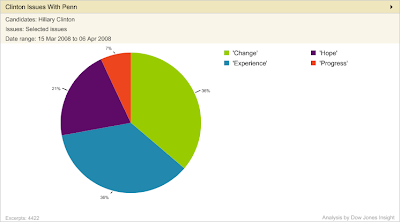In choosing their running mates, both Obama and McCain were viewed as having selected candidates who could compensate for their own areas of actual or perceived weakness – in Obama’s case the issue of experience especially as it relates to foreign policy, and in McCain’s case, his lack of appeal to the party’s conservative base as well as his age. Based on analysis of mainstream media sources tracked by Dow Jones Insight, they may not be getting quite what they expected.
During the period September 18-25*, Joe Biden’s name was mentioned 470 times in connection with the issue of experience, representing 14% of his 3,466 total mentions on the 10 issues being considered. Obama, meanwhile, received 999 mentions, or 6% of his total 17,044 mentions on the 10 issues. So while Biden received fewer mentions on the topic due to his lower coverage overall, the issue of “experience” represented a significant portion of his overall coverage, indicating that this message is coming across well.
Another area in which Biden’s share exceeded Obama’s during the period was the issue of taxes, though this outcome may be have been more inadvertent than by design. Biden received 986 mentions in conjunction with taxes, or 28% of his total, while Obama received 2,316 mentions on taxes, or 14% of his total mentions. The primary driver for Biden’s coverage was his statement that it would be patriotic for wealthy Americans to pay higher taxes – a statement the Republicans immediately attacked and that served as a distraction from the foreign policy expertise that Biden’s presence on the ticket was expected to fill.
Looking at some key foreign policy issues – specifically Iraq, Iran and terrorism – Biden only had a higher proportion of coverage than Obama on Iraq, with 164 mentions, or 5%, compared to Obama’s 437, or 3%. On Iran, Biden had 103 mentions, or 3%, compared to Obama’s 644, or 4%, while on terrorism, Biden received 172 mentions, or 5%, and Obama received 883 mentions, also 5%.
On the Republican side, Palin received higher percentages of coverage than her running mate on a number of issues unrelated to the reasons she was selected. Aside from the economy, which was the top issue for both McCain and Palin, her largest percentage of coverage on the 10 issues came on the topic of experience, for which she received 1,455 mentions, or 20% of her 7,302 total mentions on the issues considered. McCain received 1,513 mentions, or 8% of a total 18,857 mentions on the tracked issues. Given her short tenure as governor, discussions of Palin and experience are clearly not a positive development for the McCain team.
Palin also exceeded McCain on Iran, Iraq and terrorism, topics on which her knowledge is being challenged. She received 726 mentions, or 10%, on Iran compared to McCain’s 751 mentions, or 4%; 190 mentions on Iraq, or 2.6%, compared to McCain’s 410, or 2.2%; and 586 mentions, or 8%, on terrorism compared to McCain’s 1,206, or 6%.
On the issue of energy, an expected Palin strength, the vice presidential candidate received 249 mentions, or 3%, which McCain also exceeded, netting 883 mentions, or 5%.
 *The analyzed period begins a few days after the start of the current crisis in the financial markets (September 15) and ends prior to the first presidential debate (September 26). We opted to omit those periods as they would have skewed coverage toward the economy and foreign policy.
*The analyzed period begins a few days after the start of the current crisis in the financial markets (September 15) and ends prior to the first presidential debate (September 26). We opted to omit those periods as they would have skewed coverage toward the economy and foreign policy.Methodology: Mainstream press sources include more than 6,000 newspapers, wires, magazines, radio and TV transcripts and more than 13,000 current-awareness news Web sites. The 10 issues chosen were selected as most closely aligned with the areas of weakness the candidates needed to fill.


